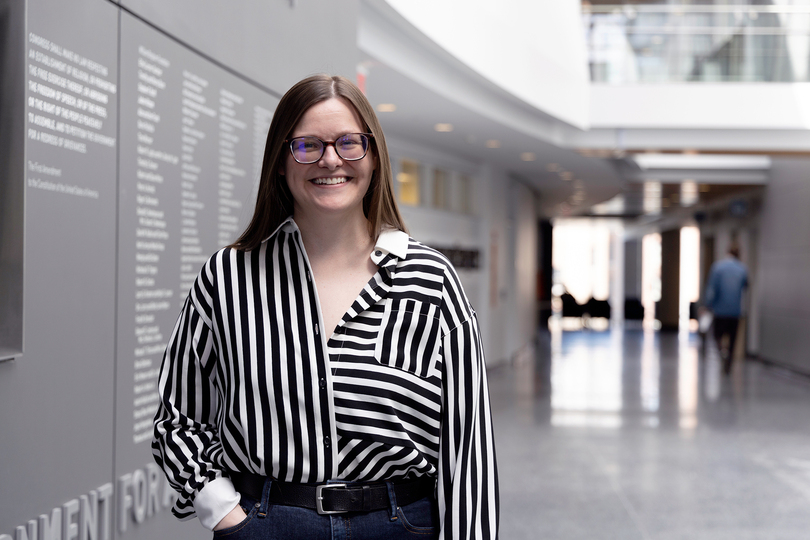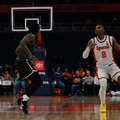Guest Essay: Graduate students shouldn’t need to fight for accommodations

Our columnist advocates for improved disability accommodations in reflecting on her time as a graduate student at SU. She notes the stigma preventing the voicing of needs, analyzing how requirements can be better met. Solange Jain | Photo Editor
Get the latest Syracuse news delivered right to your inbox.
Subscribe to our newsletter here.
Hover over the “Students” tab on Syracuse University’s Center for Disability Resources page. You’ll see three drop-downs, including an option for “Graduate Students.” There, you’ll find information about disability accommodations, which hasn’t always existed.
What’s less obvious from seeing that tab is the years of advocacy members of the Graduate Student Organization’s DEIA committee — including myself — put in to get it. This visible inclusion now advises students employed by the university to contact an additional department for workplace accommodations.
However, public graduate student accommodation information is just one step toward real inclusion. If you didn’t know about the accommodation process before, it’s probably because university systems assume able-bodied students are the norm. This narrative leaves the disabled 14% of the United States population out of the conversation. Anyone who needs accommodations is othered and treated as a problem to be solved, left without aid if they don’t self-advocate.
In 1990, under the Americans with Disabilities Act, “reasonable accommodations” became essential in education spaces. Organizations aren’t supposed to make getting accommodations an “undue hardship.”
Yet even for the half of U.S. graduate students currently depressed or anxious, many even experiencing suicidal ideation, accommodations are still an afterthought. It’s like they’re in place simply to follow the law when the real motivator should be giving disabled people the resources to fully participate in their education.
SU can be thought of as disability-friendly because of its undergraduate student-focused programs like InclusiveU and OnTrack. But most of these initiatives aren’t built with graduate students in mind, even though we make up roughly one-third of the student body.
But this isn’t just an SU issue. Disabled scholars are underrepresented in academia overall. When they’re present, they’re paid less and have lower chances of obtaining tenure or higher faculty ranks. That’s not surprising given scholars suggest society still allows for discrimination against disabled people.
My experience as a disabled graduate student is just one of many that shows how much easier it is to hide disabilities than get accommodations in a university that often overlooks you.
I have trouble reading PDFs, especially when text is slanted. This usually happens if a professor photocopies pages, so sometimes I need a screen reader to get through assignments.
But there isn’t a drop-down button I can click to tell anyone that. Instead, I have to meet one-on-one with my professors. It’s an awkward conversation where I feel like I’m saying, “Hi, I’m disabled. Here’s more unpaid work you have to do or you’ll get in trouble.”
This is extra stressful as a graduate student because I may work with these professors for the rest of my life. Academia is a small field; I’ll see people who taught me five years ago at conferences, we’ll work on papers together and speak on the same panel. I can’t reverse my disclosure. Once they know I’m disabled, they’ll know forever, and that’s scary.
Usually, I just tried to find scalable text on my own to avoid bothering or inconveniencing anyone. That meant spending hours during the weekend tracking down a quality version of a reading, or sometimes skipping it altogether.
I want to see a plan for long-term changes that focuses on holistic institutional accessibility and doesn’t force any students into disclosure.Jocelyn McKinnon-Crowley, Guest columnist
Going through the process with three or four professors a semester for two years was exhausting. By the time my final semester of coursework rolled around, I had given up. I didn’t have the energy to explain scalable text again or apologize for asking them to do more. I was tired.
At the end of my PhD coursework, I took qualifying exams. These are a big deal, yet there’s no baseline of accommodations for graduate student-specific tests.
I get extra time during in-class exams. However, when I questioned the lack of support during my first year in the program, I was basically asked by an administrator what I expected from graduate school. The official procedure, as far as I understand it, is to talk to CDR who will then talk to your department.
For something like qualifying exams, a process most people only go through once in their life, it’s impossible to know ahead of time what you’ll need. Because every department has different qualifying exam procedures, getting accommodations isn’t as simple as sending the CDR an email. The process is opaque, and it was all extra work for me. It was like punishment for needing more help.
I didn’t want to look like I was being given special treatment. I didn’t want to sit in front of my colleagues, who are also my employers, and ask for help. I didn’t want to be the first person who needed accommodations in a qualifying exam, I just wanted to pass. But I wasn’t confident my requests would be handled with care, compassion and understanding. It was easier to say nothing, and many disabled graduate students across the country feel the same way.
In the end, I didn’t get any accommodations for my qualifying exams. I didn’t feel safe. I wrote all three of them with no notes for four hours in a room. I passed, but I sacrificed my body in the process.
I’m guessing my colleagues didn’t have panic attacks or spend 20 minutes just looking at the screen crying. But it’s hard to tell because we don’t talk about the disabled graduate student experience enough.
I don’t want sympathy. Instead, I want university administrators and professors to meet me where I am, which means centering the needs of all disabled students. I want to see a plan for long-term changes that focuses on holistic institutional accessibility and doesn’t force any students into disclosure.
Accommodations should be in place before I have to ask for them, as is prescribed in the universal design for learning. That means including Communication Access Realtime Translation services at every major event, listing the heights of desks around campus so we know if a wheelchair can fit under them and granting more flexibility on university paperwork submission.
The list goes on, but the point remains: I want the university to be focused on being inclusive to all students like they describe in the mission statement, not just on the able-bodied ones they showcase in promotional photos. I’d like to be treated like a person instead of an inconvenience.
Jocelyn McKinnon-Crowley is a PhD Candidate in the S.I. Newhouse School of Public Communications. She can be reached at @jmckin02@syr.edu.






